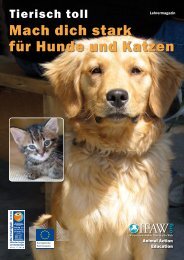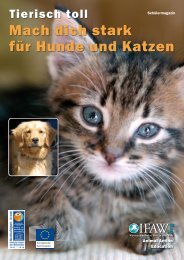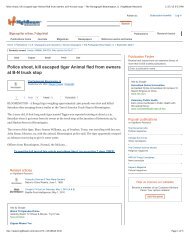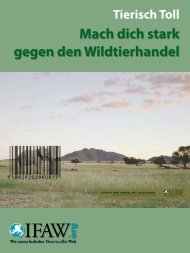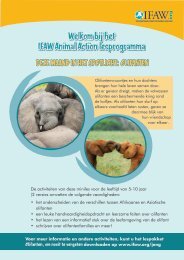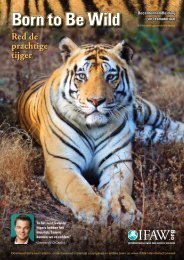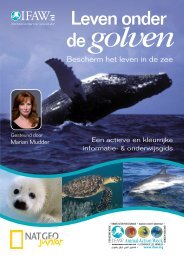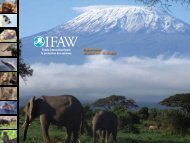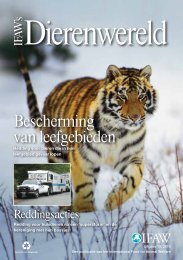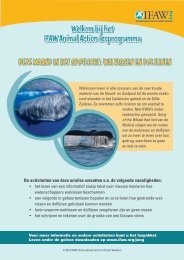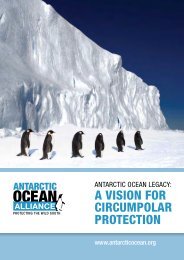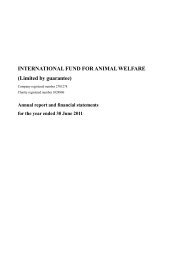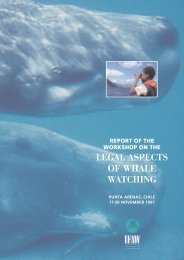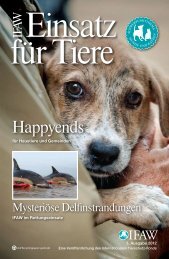the conditions under which ivory trade could be - International Fund ...
the conditions under which ivory trade could be - International Fund ...
the conditions under which ivory trade could be - International Fund ...
You also want an ePaper? Increase the reach of your titles
YUMPU automatically turns print PDFs into web optimized ePapers that Google loves.
PROPOSAL: CoP16 Doc. 37<br />
Proposal to amend Decision 14.77 on a decision-making<br />
mechanism for a future <strong>trade</strong> in elephant <strong>ivory</strong><br />
PROPONENTS:<br />
Benin, Burkina Faso, Mali, Li<strong>be</strong>ria, Central African<br />
Republic, Nigeria, Côte d’Ivoire and Kenya<br />
IFAW RECOMMENDATION: SUPPORT<br />
Analysis<br />
IFAW fully supports <strong>the</strong> assertion in <strong>the</strong> proposal<br />
by Benin et al. that it is <strong>the</strong> fundamental responsibility<br />
of <strong>the</strong> Conference of <strong>the</strong> Parties to ensure that any<br />
eventual decision to allow <strong>ivory</strong> <strong>trade</strong> in <strong>the</strong> future in<br />
no way stimulates, encourages, causes or provokes<br />
elephant poaching or illegal <strong>ivory</strong> <strong>trade</strong>. Indeed an essential<br />
element of any decision by <strong>the</strong> Parties to allow<br />
<strong>trade</strong> in a CITES-listed species is a prior, affi rmative<br />
determination that <strong>the</strong> <strong>trade</strong> will not <strong>be</strong> detrimental to<br />
<strong>the</strong> survival of <strong>the</strong> species in <strong>the</strong> wild. Trade, including<br />
possibly legal <strong>trade</strong>, in <strong>ivory</strong> is having extreme detrimental<br />
impacts on elephants in <strong>the</strong> wild.<br />
Though current sources of data about <strong>the</strong> illegal<br />
killing of elephants and illegal <strong>ivory</strong> <strong>trade</strong> cannot<br />
conclusively prove direct causal links <strong>be</strong>tween CITESsanctioned<br />
stockpile sales in 1999 and 2008 and<br />
increased rates of poaching and illegal <strong>ivory</strong> <strong>trade</strong>,<br />
<strong>the</strong> correlations <strong>be</strong>tween decisions to allow stockpile<br />
sales, actual sales, and sharp increases in poaching<br />
1<br />
<strong>International</strong> <strong>Fund</strong> for Animal Welfare<br />
POLICY BRIEF<br />
Amending Decision 14.77<br />
on a Decision-making<br />
Mechanism for Process of<br />
Trade in Elephant Ivory<br />
(Benin, Burkina Faso, Mali, Lie<strong>be</strong>ria,<br />
Central African Republic, Nigeria, Côte d’Ivoire<br />
and Kenya)<br />
and illegal <strong>ivory</strong> seizures over <strong>the</strong> last few years are too<br />
distinct to <strong>be</strong> ignored, and <strong>the</strong> complexity and interconnectedness<br />
of <strong>the</strong> global illegal <strong>trade</strong> in <strong>ivory</strong> must<br />
<strong>be</strong> taken into account when making decisions about<br />
<strong>the</strong> future of elephants.<br />
According to all sources of information used by<br />
CITES Parties to ascertain <strong>the</strong> status of elephants<br />
impacted by <strong>ivory</strong> <strong>trade</strong>, elephant poaching and illegal<br />
<strong>ivory</strong> <strong>trade</strong> has reached crisis proportions. Illegal killing<br />
of elephants has increased in all four sub-regions of<br />
Africa, including areas of Sou<strong>the</strong>rn Africa previously<br />
thought to <strong>be</strong> safe from poachers and <strong>the</strong>ir networks,<br />
and illegal <strong>ivory</strong> <strong>trade</strong> has reached a level not seen<br />
since 1989, when CITES banned <strong>the</strong> commercial <strong>trade</strong><br />
in <strong>ivory</strong> following a similar wholesale decimation of<br />
elephants for <strong>ivory</strong> continent-wide.<br />
And, <strong>the</strong> trend in illegal killing of elephants mirrors<br />
closely <strong>the</strong> incredible growth in consumer purchasing<br />
power in China and o<strong>the</strong>r <strong>ivory</strong> consuming markets – a<br />
power that will only lead to <strong>the</strong> extermination of elephants<br />
through <strong>the</strong>ir range if swift and decisive action<br />
is not taken by range, consumer, and indeed all states<br />
with in interest in protecting elephants for future generations.<br />
The Parties to CITES must take all of <strong>the</strong>se<br />
factors into account when making decisions that <strong>could</strong><br />
impact <strong>the</strong> continued survival of elephants throughout<br />
much of <strong>the</strong>ir range in Africa.<br />
Thus, IFAW <strong>be</strong>lieves that if any credible evidence<br />
exists that decisions to allow limited <strong>ivory</strong> <strong>trade</strong> (i.e.<br />
www.ifaw.org
stockpile sales) by <strong>the</strong> Parties to CITES <strong>could</strong> drive<br />
increases in poaching and illegal <strong>ivory</strong> <strong>trade</strong>, <strong>the</strong> <strong>trade</strong><br />
should <strong>be</strong> avoided until such time as clear evidence indicates<br />
o<strong>the</strong>rwise. Not until such a time that poaching<br />
and illicit <strong>trade</strong> are <strong>under</strong> control and it can <strong>be</strong> shown<br />
that legal <strong>trade</strong> does not drive illegal activities should<br />
legal <strong>trade</strong> <strong>be</strong> considered <strong>under</strong> any future decisionmaking<br />
mechanism for future <strong>ivory</strong> <strong>trade</strong>.<br />
Thus, IFAW urges Parties to support <strong>the</strong> decision<br />
proposed by Benin et al., <strong>which</strong> would require Parties<br />
to assess any possible future decision-making mechanism<br />
for <strong>ivory</strong> <strong>trade</strong> with respect to its conservation<br />
impact on elephant populations nationally, continentally,<br />
and globally, and would ensure that any decisionmaking<br />
mechanism for future <strong>ivory</strong> <strong>trade</strong> is made<br />
in accordance with <strong>the</strong> vision, goals, and prioritized<br />
objectives of <strong>the</strong> African Elephant Action Plan, <strong>the</strong> fi rst<br />
of <strong>which</strong> is to reduce elephant poaching and illegal<br />
<strong>ivory</strong> <strong>trade</strong>. IFAW notes that <strong>the</strong> language suggested<br />
by <strong>the</strong> proponents <strong>could</strong> also <strong>be</strong> incorporated into <strong>the</strong><br />
draft decision proposed by <strong>the</strong> Secretariat in CoP16<br />
Doc. 36 relating to <strong>the</strong> decision-making mechanism for<br />
future <strong>ivory</strong> <strong>trade</strong>. ■<br />
2<br />
<strong>International</strong> <strong>Fund</strong> for Animal Welfare<br />
POLICY BRIEF<br />
www.ifaw.org



